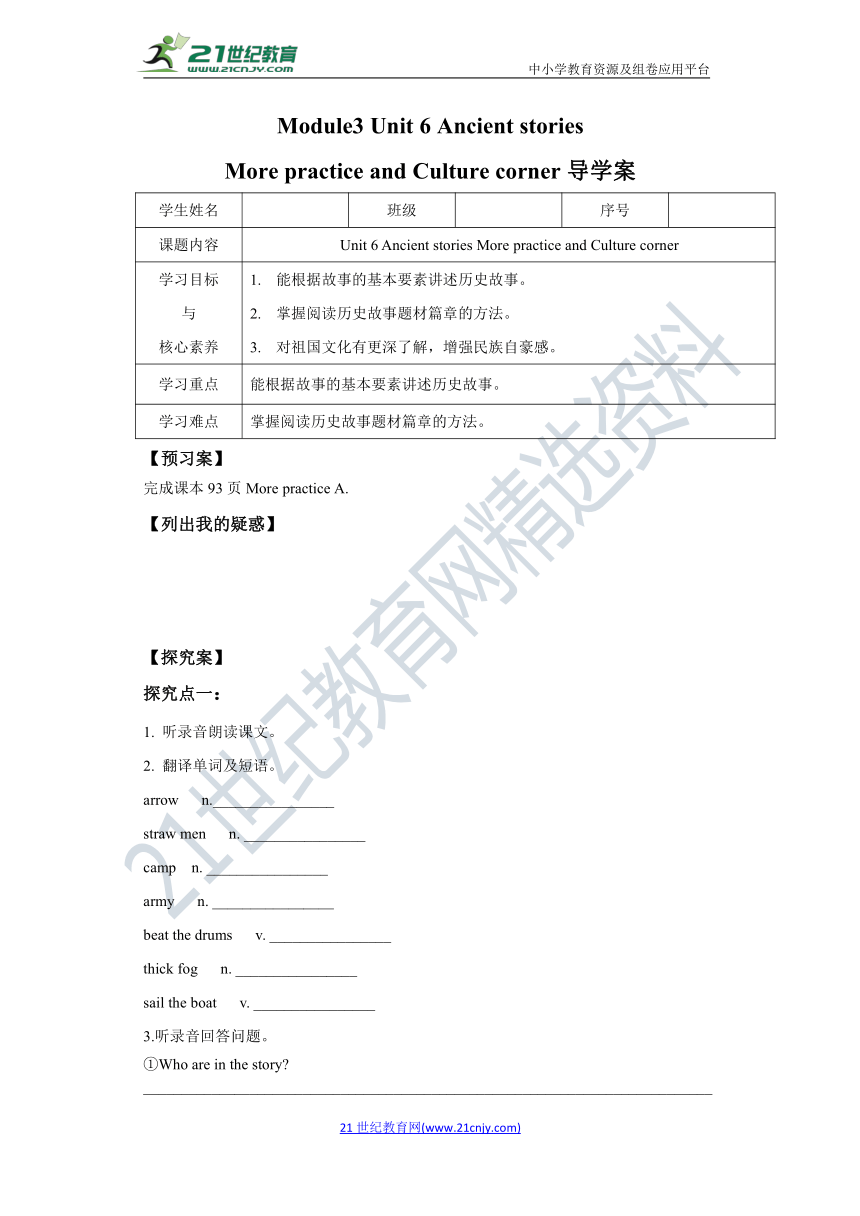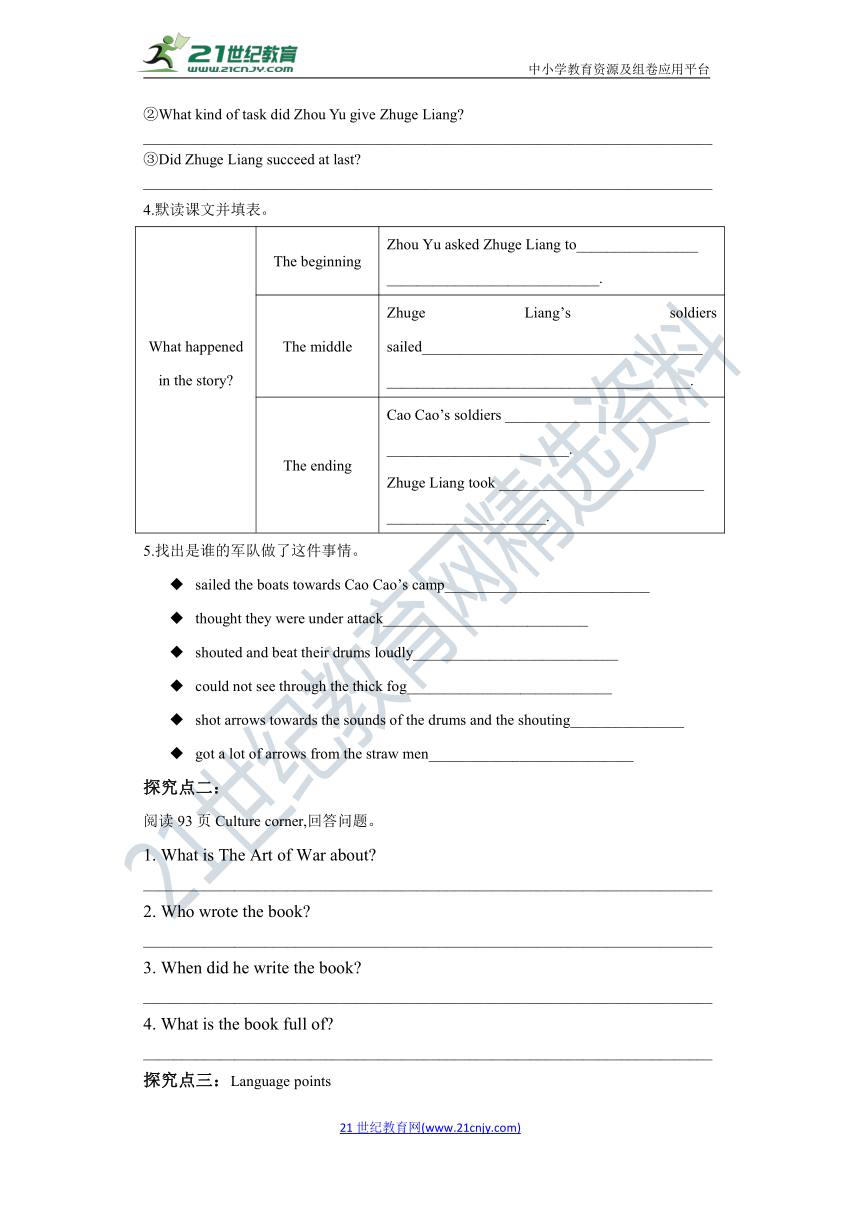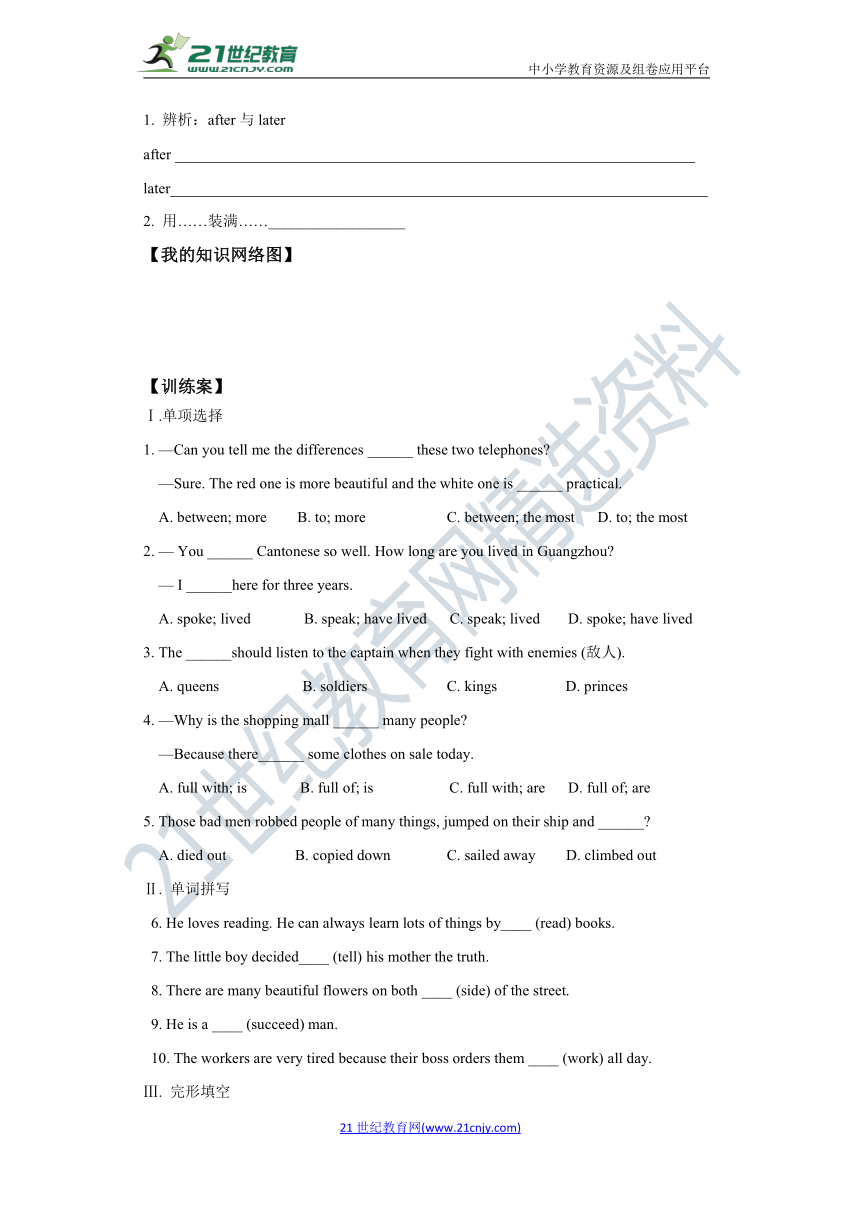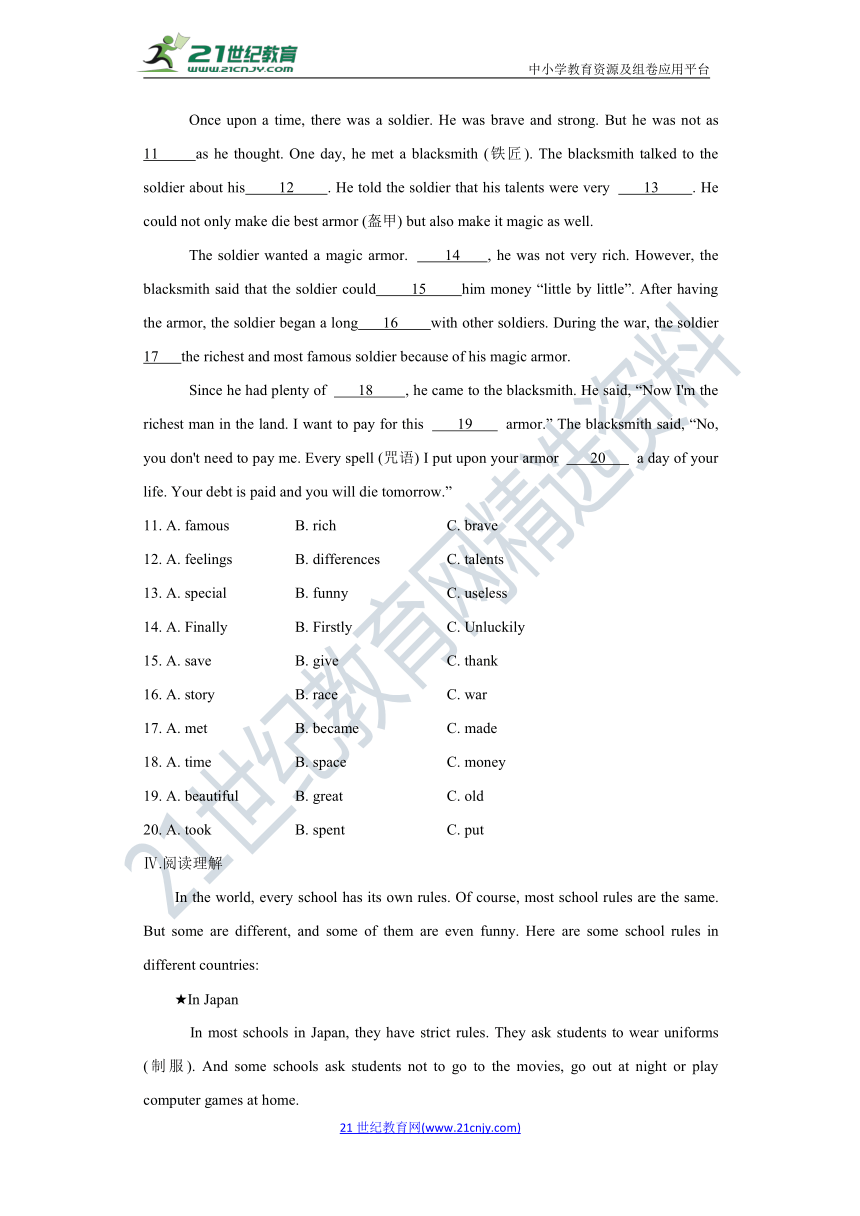Unit6 Ancient stories第4课时More practice and culture corner导学案
文档属性
| 名称 | Unit6 Ancient stories第4课时More practice and culture corner导学案 |  | |
| 格式 | doc | ||
| 文件大小 | 1.7MB | ||
| 资源类型 | 试卷 | ||
| 版本资源 | 牛津深圳版 | ||
| 科目 | 英语 | ||
| 更新时间 | 2020-11-23 15:49:54 | ||
图片预览




文档简介
中小学教育资源及组卷应用平台
Module3 Unit 6 Ancient stories
More practice and Culture corner导学案
学生姓名
班级
序号
课题内容 Unit 6 Ancient stories More practice and Culture corner
学习目标 与
核心素养 能根据故事的基本要素讲述历史故事。
掌握阅读历史故事题材篇章的方法。
对祖国文化有更深了解,增强民族自豪感。
学习重点 能根据故事的基本要素讲述历史故事。
学习难点 掌握阅读历史故事题材篇章的方法。
【预习案】
完成课本93页More practice A.
【列出我的疑惑】
【探究案】
探究点一:
1. 听录音朗读课文。
2. 翻译单词及短语。
arrow n.________________
straw men n. ________________
camp n. ________________
army n. ________________
beat the drums v. ________________
thick fog n. ________________
sail the boat v. ________________
3.听录音回答问题。
①Who are in the story?
___________________________________________________________________________
②What kind of task did Zhou Yu give Zhuge Liang?
___________________________________________________________________________
③Did Zhuge Liang succeed at last?
___________________________________________________________________________
4.默读课文并填表。
What happened in the story?
The beginning Zhou Yu asked Zhuge Liang to________________
____________________________.
The middle
Zhuge Liang抯 soldiers sailed_____________________________________
The ending
5.找出是谁的军队做了这件事情。
sailed the boats towards Cao Cao’s camp___________________________
thought they were under attack___________________________
shouted and beat their drums loudly___________________________
could not see through the thick fog___________________________
shot arrows towards the sounds of the drums and the shouting_______________
got a lot of arrows from the straw men___________________________
探究点二:
阅读93页Culture corner,回答问题。
1. What is The Art of War about?
___________________________________________________________________________
2. Who wrote the book?
___________________________________________________________________________
3. When did he write the book?
___________________________________________________________________________
4. What is the book full of?
___________________________________________________________________________
探究点三:Language points
1. 辨析:after与later
after ____________________________________________________________
later______________________________________________________________
2. 用……装满……__________________
【我的知识网络图】
【训练案】
Ⅰ.单项选择
1. —Can you tell me the differences ______ these two telephones?
桽ure. The red one is more beautiful and the white one is ______ practical.
A. between; more B. to; more C. between; the most D. to; the most
2. You ______ Cantonese so well. How long are you lived in Guangzhou?
I ______here for three years.
A. spoke; lived B. speak; have lived C. speak; lived D. spoke; have lived
3. The ______should listen to the captain when they fight with enemies (敌人).
A. queens B. soldiers C. kings D. princes
4. —Why is the shopping mall ______ many people?
—Because there______ some clothes on sale today.
A. full with; is B. full of; is C. full with; are D. full of; are
5. Those bad men robbed people of many things, jumped on their ship and ______?
A. died out B. copied down C. sailed away D. climbed out
Ⅱ. 单词拼写
6. He loves reading. He can always learn lots of things by____ (read) books.
7. The little boy decided____ (tell) his mother the truth.
8. There are many beautiful flowers on both ____ (side) of the street.
9. He is a ____ (succeed) man.
10. The workers are very tired because their boss orders them ____ (work) all day.
Ⅲ. 完形填空
Once upon a time, there was a soldier. He was brave and strong. But he was not as 11 as he thought. One day, he met a blacksmith (铁匠). The blacksmith talked to the soldier about his 12 . He told the soldier that his talents were very 13 . He could not only make die best armor (盔甲) but also make it magic as well.
The soldier wanted a magic armor. 14 , he was not very rich. However, the blacksmith said that the soldier could 15 him money “little by little”. After having the armor, the soldier began a long 16 with other soldiers. During the war, the soldier 17 the richest and most famous soldier because of his magic armor.
Since he had plenty of 18 , he came to the blacksmith. He said, “Now I'm the richest man in the land. I want to pay for this 19 armor.” The blacksmith said, “No, you don't need to pay me. Every spell (咒语) I put upon your armor 20 a day of your life. Your debt is paid and you will die tomorrow.”
11. A. famous B. rich C. brave
12. A. feelings B. differences C. talents
13. A. special B. funny C. useless
14. A. Finally B. Firstly C. Unluckily
15. A. save B. give C. thank
16. A. story B. race C. war
17. A. met B. became C. made
18. A. time B. space C. money
19. A. beautiful B. great C. old
20. A. took B. spent C. put
Ⅳ.阅读理解
In the world, every school has its own rules. Of course, most school rules are the same. But some are different, and some of them are even funny. Here are some school rules in different countries:
★In Japan
In most schools in Japan, they have strict rules. They ask students to wear uniforms (制服). And some schools ask students not to go to the movies, go out at night or play computer games at home.
★In the US
In some US schools, every student has to wear a pair of indoor shoes at school every day. This can keep the schools clean.
★In the UK
In some British schools, students can't have strange hairstyles (发型), but they can have them during the Word Cup years.
These rules are very interesting. What are the rules in your school?
21. How many countries are mentioned (提到) in this passage?
A. Three. B. Four. C. Five. D. Six.
22. What should students in most Japanese schools wear?
A. Uniforms. B. Indoor shoes. C. Shirts. D. Strange hairstyles.
23. Why do students in some US schools have to wear indoor shoes?
A. Because they will feel comfortable.
B. Because they can run in the schools.
C. Because they can keep the schools clean.
D. Because they won't fall over
24. What's the funny rule in the UK?
A. Some schools ask girls to wear the same hairstyles.
B. Some schools ask students to wear uniforms.
C. Some schools ask students not to go out at night.
D. Some schools allow students to wear strange hairstyles during the World Cup years. 25. Which of the following is NOT true according to this passage?
A. Each school has its own rules in the world.
B. Some schools in the UK ask girls to cut their hair.
C. Students in some Japanese schools can't go to the movies at night.
D. In some Japanese schools, students can't play computer games at home.
【教与学的反思】
预习案答案:
探究案答案:
探究点一:
2.
3.
4.
5.
探究点二:
探究点三:
1. after +时间段 时间段+ later
2. fill ... with ...
训练案答案:
Ⅰ. 1-5 ABBDC
Ⅱ. 6. reading 7. to tell 8. sides 9. successful 10. to work
Ⅲ. 11-15 BCACB 16-20 CBCBA
Ⅳ. 21-25 AACDB
_21?????????è?????(www.21cnjy.com)_
Module3 Unit 6 Ancient stories
More practice and Culture corner导学案
学生姓名
班级
序号
课题内容 Unit 6 Ancient stories More practice and Culture corner
学习目标 与
核心素养 能根据故事的基本要素讲述历史故事。
掌握阅读历史故事题材篇章的方法。
对祖国文化有更深了解,增强民族自豪感。
学习重点 能根据故事的基本要素讲述历史故事。
学习难点 掌握阅读历史故事题材篇章的方法。
【预习案】
完成课本93页More practice A.
【列出我的疑惑】
【探究案】
探究点一:
1. 听录音朗读课文。
2. 翻译单词及短语。
arrow n.________________
straw men n. ________________
camp n. ________________
army n. ________________
beat the drums v. ________________
thick fog n. ________________
sail the boat v. ________________
3.听录音回答问题。
①Who are in the story?
___________________________________________________________________________
②What kind of task did Zhou Yu give Zhuge Liang?
___________________________________________________________________________
③Did Zhuge Liang succeed at last?
___________________________________________________________________________
4.默读课文并填表。
What happened in the story?
The beginning Zhou Yu asked Zhuge Liang to________________
____________________________.
The middle
Zhuge Liang抯 soldiers sailed_____________________________________
The ending
5.找出是谁的军队做了这件事情。
sailed the boats towards Cao Cao’s camp___________________________
thought they were under attack___________________________
shouted and beat their drums loudly___________________________
could not see through the thick fog___________________________
shot arrows towards the sounds of the drums and the shouting_______________
got a lot of arrows from the straw men___________________________
探究点二:
阅读93页Culture corner,回答问题。
1. What is The Art of War about?
___________________________________________________________________________
2. Who wrote the book?
___________________________________________________________________________
3. When did he write the book?
___________________________________________________________________________
4. What is the book full of?
___________________________________________________________________________
探究点三:Language points
1. 辨析:after与later
after ____________________________________________________________
later______________________________________________________________
2. 用……装满……__________________
【我的知识网络图】
【训练案】
Ⅰ.单项选择
1. —Can you tell me the differences ______ these two telephones?
桽ure. The red one is more beautiful and the white one is ______ practical.
A. between; more B. to; more C. between; the most D. to; the most
2. You ______ Cantonese so well. How long are you lived in Guangzhou?
I ______here for three years.
A. spoke; lived B. speak; have lived C. speak; lived D. spoke; have lived
3. The ______should listen to the captain when they fight with enemies (敌人).
A. queens B. soldiers C. kings D. princes
4. —Why is the shopping mall ______ many people?
—Because there______ some clothes on sale today.
A. full with; is B. full of; is C. full with; are D. full of; are
5. Those bad men robbed people of many things, jumped on their ship and ______?
A. died out B. copied down C. sailed away D. climbed out
Ⅱ. 单词拼写
6. He loves reading. He can always learn lots of things by____ (read) books.
7. The little boy decided____ (tell) his mother the truth.
8. There are many beautiful flowers on both ____ (side) of the street.
9. He is a ____ (succeed) man.
10. The workers are very tired because their boss orders them ____ (work) all day.
Ⅲ. 完形填空
Once upon a time, there was a soldier. He was brave and strong. But he was not as 11 as he thought. One day, he met a blacksmith (铁匠). The blacksmith talked to the soldier about his 12 . He told the soldier that his talents were very 13 . He could not only make die best armor (盔甲) but also make it magic as well.
The soldier wanted a magic armor. 14 , he was not very rich. However, the blacksmith said that the soldier could 15 him money “little by little”. After having the armor, the soldier began a long 16 with other soldiers. During the war, the soldier 17 the richest and most famous soldier because of his magic armor.
Since he had plenty of 18 , he came to the blacksmith. He said, “Now I'm the richest man in the land. I want to pay for this 19 armor.” The blacksmith said, “No, you don't need to pay me. Every spell (咒语) I put upon your armor 20 a day of your life. Your debt is paid and you will die tomorrow.”
11. A. famous B. rich C. brave
12. A. feelings B. differences C. talents
13. A. special B. funny C. useless
14. A. Finally B. Firstly C. Unluckily
15. A. save B. give C. thank
16. A. story B. race C. war
17. A. met B. became C. made
18. A. time B. space C. money
19. A. beautiful B. great C. old
20. A. took B. spent C. put
Ⅳ.阅读理解
In the world, every school has its own rules. Of course, most school rules are the same. But some are different, and some of them are even funny. Here are some school rules in different countries:
★In Japan
In most schools in Japan, they have strict rules. They ask students to wear uniforms (制服). And some schools ask students not to go to the movies, go out at night or play computer games at home.
★In the US
In some US schools, every student has to wear a pair of indoor shoes at school every day. This can keep the schools clean.
★In the UK
In some British schools, students can't have strange hairstyles (发型), but they can have them during the Word Cup years.
These rules are very interesting. What are the rules in your school?
21. How many countries are mentioned (提到) in this passage?
A. Three. B. Four. C. Five. D. Six.
22. What should students in most Japanese schools wear?
A. Uniforms. B. Indoor shoes. C. Shirts. D. Strange hairstyles.
23. Why do students in some US schools have to wear indoor shoes?
A. Because they will feel comfortable.
B. Because they can run in the schools.
C. Because they can keep the schools clean.
D. Because they won't fall over
24. What's the funny rule in the UK?
A. Some schools ask girls to wear the same hairstyles.
B. Some schools ask students to wear uniforms.
C. Some schools ask students not to go out at night.
D. Some schools allow students to wear strange hairstyles during the World Cup years. 25. Which of the following is NOT true according to this passage?
A. Each school has its own rules in the world.
B. Some schools in the UK ask girls to cut their hair.
C. Students in some Japanese schools can't go to the movies at night.
D. In some Japanese schools, students can't play computer games at home.
【教与学的反思】
预习案答案:
探究案答案:
探究点一:
2.
3.
4.
5.
探究点二:
探究点三:
1. after +时间段 时间段+ later
2. fill ... with ...
训练案答案:
Ⅰ. 1-5 ABBDC
Ⅱ. 6. reading 7. to tell 8. sides 9. successful 10. to work
Ⅲ. 11-15 BCACB 16-20 CBCBA
Ⅳ. 21-25 AACDB
_21?????????è?????(www.21cnjy.com)_
